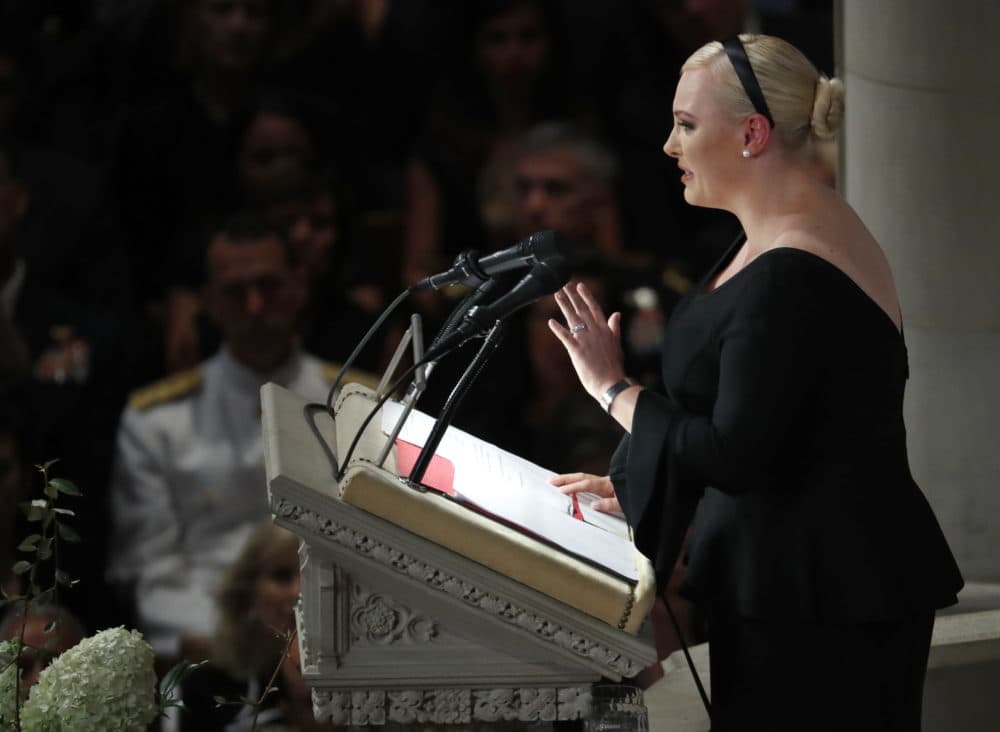Advertisement
Commentary
Let's Stop Trying To Change Each Other And Start Trying To Understand Each Other

Meghan McCain told the following story in the eulogy she gave for her father on September 1, 2018.
I was a small girl, thrown from a horse and crying from a busted collarbone. My dad picked me up. He took me to the doctor, he got me all fixed up. Then he immediately took me back home and made me get back on that very same horse. I was furious at him as a child, but how I love him for it now.
Weeks later, her words are like a burr in my mind. I keep fooling with them to try to wiggle loose what I feel. Nothing I’ve read or heard elsewhere in the national conversation has made me think so hard about the psychology behind the American political divide as these few words.
Reflecting on McCain’s anecdote has led me to believe that, among its many polarizations, the country is split about how best to handle emotional pain. And about what constitutes strength.
I’ve started wondering if that’s a place where we could fruitfully converse.
I imagine everyone would agree that all lives include not just accidents, but terrible experiences and times of great difficulty. Loss, abandonment, betrayal, profound harm. All of us have moments when we fear that there is no going forward.

Meghan McCain’s worldview, which she attributes to her father, emphasizes the need to immediately keep going no matter what. You might feel angry at your dad for forcing you so quickly back on the horse when you’re still so sore and shaken up. But you do it because that’s the best way to recover from the experience.
Eventually, you express gratitude for the lesson. As an adult, you look back at your life, and recall the expression of pride and love in your father’s eyes saying, “Nothing is going to break you,” as you climbed back up and rode again.
Your collarbone is broken, but not your spirit. “Nothing is going to break you,” becomes love’s mantra and pride realized. More generally though, if you are suffering from an experience that you cannot master, you keep it to yourself. An invulnerable public face is of the essence — this dictum was at the heart of Meghan McCain's story. The world can be hard and hostile and you must be tough.
Certainly we agree that the world can be hard and hostile. But how best to bear it?
My own world view, largely formed by working as a psychotherapist — and which I experience as opposite to McCain’s — also encourages you to remount the horse, or perhaps another horse if the same one is likely quickly to throw you again. But either way, it’s okay to wait until the cast is off, the bone mended, or at least until after the shock of the fall is over.
Certainly we agree that the world can be hard and hostile. But how best to bear it?
This view holds that not all regression leads to a loss of spirit, not every animal must be ridden, and not all public displays of vulnerability are shameful. Sometimes even the open recounting of suffering can be psychologically healing and personally dignified.
As I and others have noted, some of the young women running for Congress this cycle, including Alexandria Ocascio-Cortez, Ayanna Pressley and MJ Hegar, are refusing the invulnerable public face. (Perhaps it’s a coincidence that all of those women are Democrats, but I suspect it’s another indication of the differences between our political parties.) These young women talk about scrambling to make ends meet, working several jobs to get through school, or surviving domestic violence and sexual abuse in their families of origin. They present themselves as healing and healed rather than unbroken. They assert that their struggles heighten their concern for others and inform their political perspective.
Parental love leads us to try to protect our children by conveying the dangers we have known, by preparing them for the world as we have seen it. If we look for its message, the “McCain” position suggests the first priority is to be aware of your enemies — who will destroy you if you flinch. John McCain was a warrior, and certainly on a military battlefield, his perspective seems essential. But what serves best on the daily domestic and workplace battlefields?
While my work creates a bias about what is better, it also has taught me to be curious.
If we could try to tell each other true stories about how we have lived, loved and struggled, perhaps we could resume seeing each other as people and not just as opponents.
I’d love to have opportunity to really hear Meghan talk about the fall from her horse and how it affected her. I’d love to hear any of the candidates running for office this year do the same about their struggles. Maybe such a conversation could become a place of common ground?
The country seems polarized in every way imaginable — by our politics, our demographics, our geography. It’s so hard to see a way forward. But maybe talking more frankly and listening more carefully about our lives could mend us more than trying to convince each other about political views. If we could try to tell each other true stories about how we have lived, loved and struggled, perhaps we could resume seeing each other as people and not just as opponents.
As a starting point, I find myself returning to my favorite Simone Weil quotation: “The love of our neighbor in all its fullness simply means being able to say, 'What are you going through?'"
We’ve tried so much else, perhaps it’s time to ask that question.
